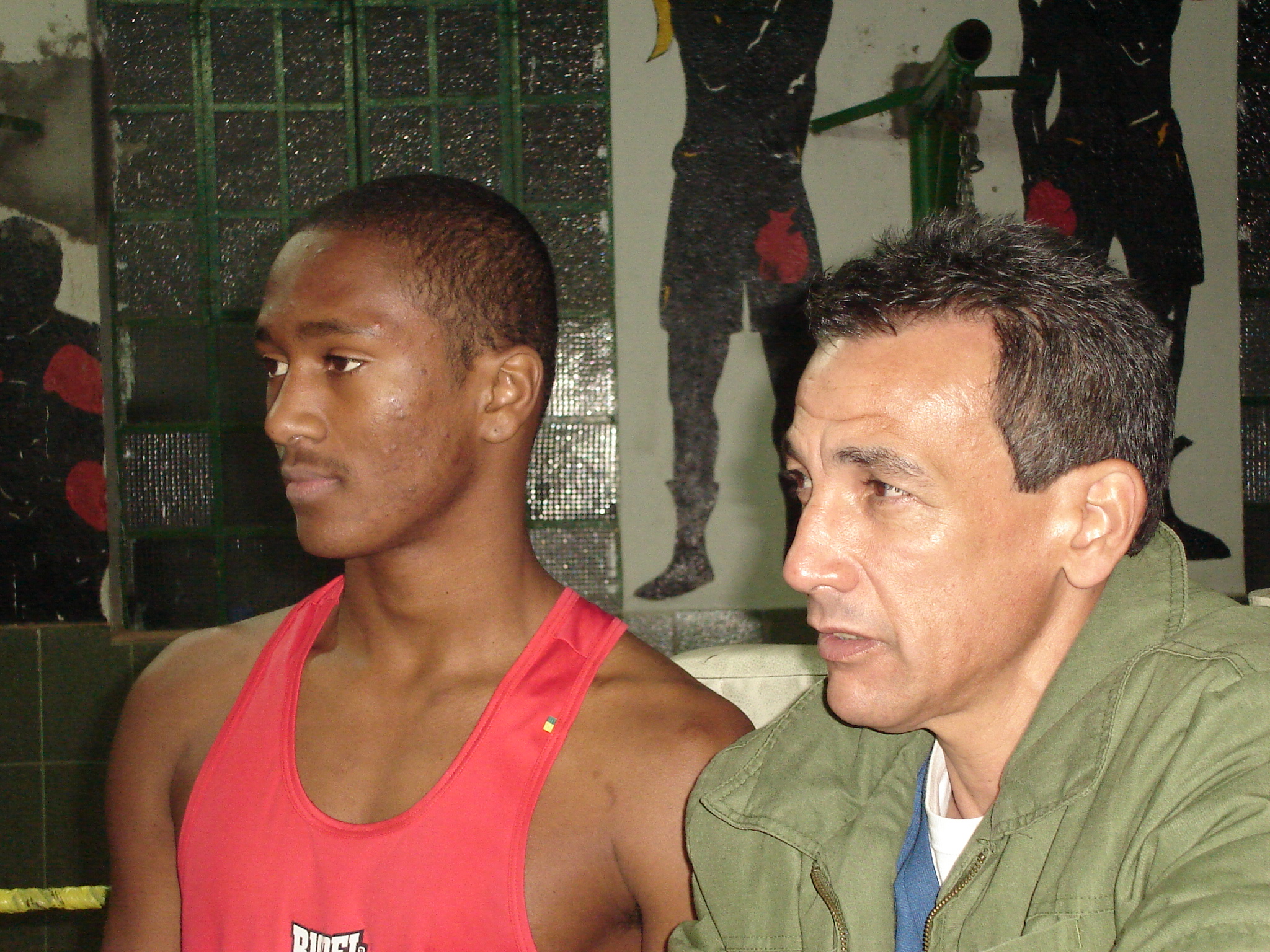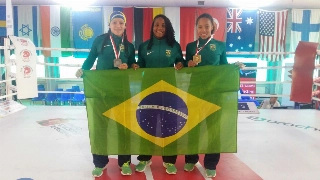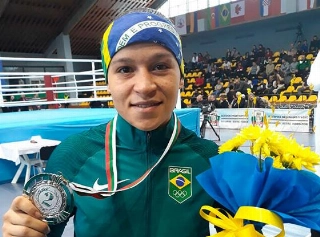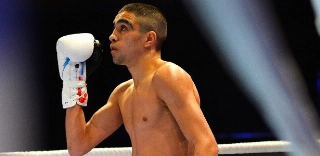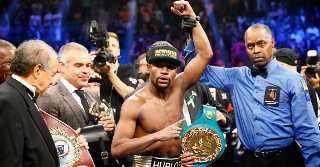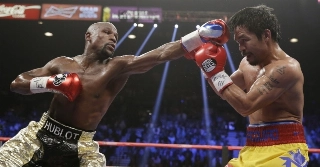Os olhos castanhos escuros têm um pouco de melancolia, mas o sorriso dos lábios grossos e negros quando sai a dissipa momentaneamente. É um menino de seus vinte e poucos anos, mas aparenta estar no fim da adolescência. As roupas que veste são de jogadores de basquete americanos assim como tantos jovens da periferia paulistana.
A melancolia é cinza como a cidade de São Paulo de ruas escuras e sujas nas regiões pobres e mesmo nos bairros brilhantes e abastados ela não se dissipa. Na Avenida Paulista as pessoas correm atrás de dinheiro e status. Douglas Ataíde luta nos ringues por dinheiro, mas não por imagem, mas para melhorar as condições de sua família.
Sua família é como tantas outras de jovens pobres. A mãe é a chefe do grupo e o outro membro é ele mesmo. Pelo boxe encontrou uma forma de redenção social e também de expressão. O rapaz é um tanto tímido.
A figura paterna encontrou em José Aparecido da Silva, o "Cido?. Técnico do Clube Atlético Guarany na zona leste de São Paulo. Muitos boxeadores tem esta relação com o técnico, pode ser vista como a mais paternal no meio esportivo.
"Filho bonito todo mundo é pai?, comenta Cido sobre os feitos do filho que o mundo lhe deu. Douglas Damião Ataíde foi apelidado por ele de "Good Boy?, em inglês mesmo que é para "pegar? no mercado estrangeiro.
O cenário brasileiro ficou pequeno para ele. O médio-ligeiro (69,9 kg) é um dos melhores do país ao lado de Patrick Teixeira. O catarinense é conhecido por sua forte pegada, enquanto Ataíde pode não bater forte, mas tem um jogo técnico e inteligente. Outro nome deste peso no país é Samir Santos Barbosa.
"Vamô neguinho? é um dos gritos que o impulsionam nos ringues e treino. Quem o dá é o "irmão? Giliard Paulino, ex-atleta da seleção nacional que mesmo em uma derrota impressionou um ginásio repleto de cubanos. Voltou a treinar boxe após pedidos do "irmão neguinho?.
O termo "neguinho? assim como "negão? no Brasil não tem a mesma conotação de "nigger? nos EUA. Depende do tom de voz utilizado e as palavras que os acompanham. As tensões raciais no Brasil são menores que na potencia do hemisfério norte. Pessoas de diversas ascendências étnicas residem na mesma rua e frequentam a mesma escola. O racismo aqui é velado camuflado pelo politicamente correto e não afeta apenas negros.
Outro conselheiro de Douglinhas é o professor Carlos Alberto. Personagem frequente nos treinos do Guarany com suas sandálias de couro e cabelos brancos crespos presos em rabo de cavalo. Virou um "tio? que lhe diz: "olhe pro alto e veja ?CSC??. Para o mentor a sigla é "Crescimento sem Convencimento?. O jovem também conta com apoio do preparador físico Fabio Giannini, algo pouco visto para atletas de boxe no Brasil.
A emancipação de Douglas veio em 2012 no Uruguai quando superou nos pontos Gilberto Pereira Santos, o "Yorubá?. Caiu no 8º giro, mas se manteve. O resultado de uma luta de boxe se dá pela soma dos pontos e não pela violência por si apenas.
Ao regressar ao embate lidando com a dor e a sensação de estar fora de eixo Douglinhas mostrou que é um dos melhores prospectos do país no panorama atual. O embate merece uma revanche, Yorubá é um atleta sério e digno como ele.
Facadas latinas No outro grande desafio Douglas não conseguiu manter a invencibilidade em sua segunda saída do país. No duelo com o argentino Jorge Sebastian Heiland encontrou um páreo. Porém não lutou contra outro rapaz pobre e latino, mas se viu envolto por uma organização.
Heiland vem da pobreza argentina, um país que sofreu com má gestão política tanto na economia como na Guerra das Malvinas além de carregar chagas por conta da ditadura militar, esta mais repreensiva que a brasileira.
Além de políticas populistas outro ponto em comum dos sul-americanos é o "jeitinho?. Infelizmente, o "jeitinho? não é só brasileiro, ganhou nome aqui, mas encontra ecos nos países sul-americanos. Douglas não foi como favorito, vinha de uma categoria mais leve, mas dado seu currículo era esperado um espetáculo.
O show foi de sua parte ao dominar os cinco rounds de início válidos pelo cinturão latino do Conselho Mundial de Boxe (CMB), porém de repente apareceu um tubo branco no ringue e a arbitragem o atribuiu como sendo dos brasileiros desclassificando Douglas que enfrentou não só Heiland, mas também o "jeitinho? hermano.
Conforme o árbitro e comentarista Daniel Fucs em seu blog no espaço Combate da Globo.com tudo que não listado como permitido no ringue é proibido. O autor do artigo questiona o que levou o árbitro argentino a posicionar os brasileiros como donos de tal objeto.
"A decisão me parece correta se falarmos de regulamento, mesmo que injusta conforme o progresso do combate. Mas é o que devia ser feito já que a TV deixou bem claro que no córner do brasileiro havia um elemento proibido, tendo sido usado ou não. O regulamento argentino no seu artigo 15.05 estabelece que o segundo, o treinador, pode levar ao ringue os seguintes itens: uma toalha com medidas máximas de 1 metro e 50 centímetros, uma esponja, uma garrafa d?água contendo água mineral, fita para as luvas, calça e sapatilha, fita adesiva, gaze esterilizada, tesoura, vendas, uma bolsa com gelo, um frasco de hemostático e um frasco de antisséptico. O artigo 15.07 estabelece que "se durante o combate, as autoridades do mesmo advertirem o uso de substâncias proibidas (todas não mencionadas no artigo 15.05) procederá o seu afastamento se utilizando do mecanismo descrito no capítulo anterior para a adoção das medidas que a posteriori podem corresponder (Desclassificação).?, assim expõe sua visão Ernesto Raúl Rodríguez do diário esportivo Olé da Argentina.
Cido ficou atônito. Afirma que em nenhum momento fizeram uso do tal tubinho e as imagens do córner confirmam suas palavras. Foi como a água "batizada? que o lateral Branco da seleção brasileira tomou por "cortesia? da seleção argentina na Copa do Mundo de 1990.
O "jeitinho? é um comportamento latino que por vezes pode ser visto com humor até, mas no fim denigre as chances destes países serem levados a sério. Enquanto os países anglo-saxões e asiáticos ricos são vistos com maior confiança mesmo que cometam também seus deslizes.
Heiland também foi vítima do sistema vigente. Seria interessante se enfrentasse o brasileiro mais uma vez como tira-teima e uma terceira vez se necessário. Porém o boxe é um jogo de bastidores ao qual ele não pertence assim como tantos garotos de luvas.
Em meio a tudo isto, o principal prejudicado é Douglas Ataíde que teve a chance de vitória usurpada. Voltou pra casa sem o sorriso no rosto ou a certeza de ter sido derrotado em combate digno. O que ele disse para sua mãe?
No fim de tudo, sul-americanos são sul-americanos. Dificilmente participam do grande esquema do mundo. Não comem mesa grande. Vassalos sonhando no dia que serão senhores e, enquanto isto, se esfaqueiam.
Douglinhas e Heiland ficam perdidos neste jogo buscando seu "Crescimento sem Convencimento?. Dois talentos que conduzidos em oportunidades honestas podem brilhar nos maiores palcos.
Growth without cockiness
The dark brown eyes carry some melancholy but when the thick and black lips smile it momentarily dissipates. He is a boy in his early twenties but looks to be in the end of his teenage years. The clothes he wears are the same of American basketball players as do many youngsters from the hoods of São Paulo, Brazil.
Melancholy is gray like the city of São Paulo that has dark and dirty alleys in the poor regions and even in the shiny and wealthy neighborhoods this feeling won?t dissipate. In the Avenida Paulista ? An avenue that can be considered the economic center of South America ? people are running after money and status. Douglas Damião Ataíde fights in the rings for cash but not in order to gain image but just improve the conditions of his family.
His family is like of many poor young folks. The mother is the chief of the clan and he is the other member. In boxing he found a way of social redemption and also to express himself. He is a little bit shy.
The father figure he found in José Aparecido da Silva a.k.a "Cido?. Boxing coach of Clube Atlético Guarany in the east zone of São Paulo. Many boxers have this relation with their coaches which can be seen as the most paternal in the sports field.
"Everybody wants to be the father of a good looking son? comments Cido about the deeds of the kid the world gave him. Douglas Damião Ataíde was nicknamed by him "Good Boy? ? in English and not Portuguese so it may "catch? in the foreign market.
The Brazilian scenario became small to him. The light-middleweight is one of the top names alongside Patrick Teixeira. The boy from the south of Brazil is known by his K.O power while Ataíde may not be a heavy hitter but has a technical and intelligent game. Another Brazilian name of respect in this division is Samir Santos Barbosa.
"Let?s go blackie? is one of the screams that gets him higher in the squared circle and during training sessions. Who shouts it is his "bro? Giliard Paulino a former amauter boxer of the national squad who even in defeat maid a gymnasium full of Cubans applause him. He went back to the boxing gym after his "lil? black brother? asked.
The term "blackie? as also "big black man? in Brazil it do not hold the same connotation of "nigger? in USA. It depends on the tone of voice used and the words that follow it. The racial tensions in Brazil are lesser than in the potency of the north hemisphere. People of many different ethnical backgrounds reside in the same street and go to the same school. Racism here is covered with a veil and camouflaged by the politically correct and do not only affect blacks.
Another counselor of Lil? Douglas is teacher Carlos Alberto. A constant character in the sparring sessions of Guarany with his leather sandals and frizzy white hair hold in a cocktail. He became an "uncle? who says "look above and see ?GWC??. For the mentor the monogram means "Growth without Cockiness?. The young man also has the support of the physical trainer Fabio Giannini something rarely seen for boxing athletes in Brazil.
The emancipation of Douglas came in 2012 in Uruguay when he defeated by points Gilberto Pereira Santos the "Yorubá?. He felt in the 8th round but kept going. The result of a boxing match is defined by the sum of points and not only by violence itself.
When he got back to the scuffle dealing with pain and the sensation of being out of his base Douglas proved that he is one of the best prospects in the actual panorama in the country. The encounter deserves a rematch as Yorubá is a serious sportsman and also honored as him.
Latino stabs
In another great challenge Douglas couldn?t maintain his invincibility. It was his second time outside the country and in a duel with Argentinian Jorge Sebastian Heiland he found a match. However he didn?t only fought against another poor latin boy as he saw himself entangled by an organization.
Heiland hails from the Argentinian poverty. A country that suffered with bad conduction in economy as also in the Malvinas-Falklands war and still has to deal with the damage done by the military dictatorship which was more reprehensive than the Brazilian.
Besides the populist political agenda another point in common in South-Americans is the "jeitinho? (smart way). Sadly the "jeitinho? is not only Brazilian ? it got it?s name here ? but finds echo in the South-American countries. Douglas didn?t go there as a favorite as he is from a lighter division but by his resume an spectacle was expected.
The show was played by him as he dominated the five initial rounds for the latin World Boxing Council belt but all of sudden a white tube emerged in the ring and the judge attributed it to the Brazilians disqualifying Douglas who did not only faced Heiland but the "hermano jeitinho? also.
The Brazilian judge and boxing commentator Daniel Fucs in his blog in the space Combate of Globo.com points that everything not listed as allowed in the ring is forbidden. The author of the article "Tubinho Polêmico? (Polemical Little Tube, in free translation) questions what made the Argentinian judge affirm that the Brazilians were the owners of such object.
"The decision seems right to me as we speak about the rules even if unfair analisying the progress of the combat. But the right thing was done since it was showcased on TV and it was clear that the Brazilian corner had a forbidden element being it used or not. The Argentinian rules book in it?s article 15.05 establishes that the cornerman ? the coach ? can take to the ring the following items: a towel measuring 1 meter and 50 centimeters, a sponge, a water bottle with mineral water, tapes for gloves, shorts and shoes, stickers, sterilized gauze, scissors, bandage, cold pack, hemostatic flask and a antiseptic flask. The 15.07 article establishes that "if during combat the authorities of the same warn of the usage of forbidden substancies (every mentioned in the 15.05 article) the banishment will procedure utilizing the mechanism foretold in the chapter before and adopting the measures mentioned corresponding (disqualification), this is how Ernesto Raúl Rodríguez of the Argentinian sports newspaper Olé exposes his vision.
Cido was out of ground. Says that in any moment they made use of such tube and the images of the corner prove his words. It was like the baptized water gave to the soccer player Branco of the Brazilian national team as a "courtesy? from the Argentinians players during World Cup ?90.
The "jeitinho? is a latino behavior which sometimes is saw with humor but in the end degenerates the chances of these countries to be taken seriously. While wealthy Anglo-Saxon and Asian countries are hold with much more trust even that they take some slips.
Heiland was also a victim of the current system. It would be interesting if he got another shot with the Brazilian and even a third if necessary. However boxing is a backstage game which boys with gloves don?t belong.
In the middle of all that the most damaged is Douglas Ataíde who had his chance of victory usurped. He came back to home without a smile or the certainness of being defeated in a fair duel. What did he say to his mom?
In the end of the day South-Americans are South-Americans. Hardly they take part in the big schemes of the world. They don?t sit in the big table. Vassals dreaming of the day they will be lords and while that they stab each other.
Lil? Douglas and Heiland are lost in this game while searching for "Growth without Cockiness?. Two talents that conducted in honest ways can shine in bigger stages.
Imagem: @CowboySLCrédito da foto: Douglas Ataíde e Cido / Gabriel Leão